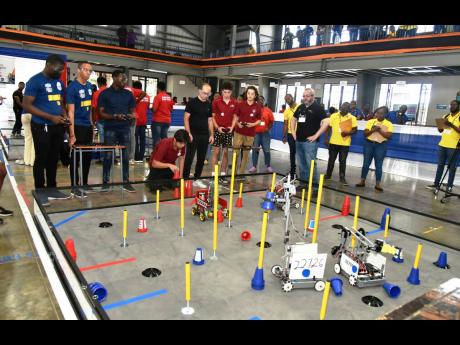Donna-Marie Wynter-Adams | STEM is vehicle for future not a destination
In recent times, there has been much discourse about the University of Technology (UTech), Jamaica, and STEM education. The general interpretation seems to be of STEM (science, technology, engineering, and mathematics) as a destination.
Since all persons cannot be in these four areas, a more cosmopolitan interpretation is required. This entails the use of STEM principles to develop innovative graduates with critical thinking skills to solve problems in whatever field they are employed. Graduates so equipped would be able to do knowledge transfer with flexibility to adapt in their field.
ROLE OF STEM IN EDUCATION AND SPORT
It is my belief that using STEM approach that integrates the Engineering Design Process (EDP) and the Scientific Method can be adapted to any subject or discipline. EDP allows students to identify problems, brainstorm in groups to solve the problem, imagine/develop solutions, select a promising solution to create a proposal/prototype, and test the prototype then re-design as needed.
This is a strategy that can be employed in sport, law, humanities, or business as it uses a sequential plan for problem-solving while building teamwork and leadership skills. The Scientific Method employs a similar method: making an observation, finding out more about the topic, developing a theory which is then tested, and analysing the data before reporting the conclusions. Another method of problem-solving using a logical, stepwise approach. Both strategies under STEM would require instructors to align the elements of the syllabus with STEM areas.
STUDENT ENGAGEMENT THROUGH STEM PRINCIPLES
The next step involves the 5Es of student-centred learning: Engagement of the student, allowing them to be involved by exploring the topic; Explanation of the concept; Encouragement to Elaborate based on what they learnt about the topic; Evaluation of the merits of the concept and Extension of knowledge with students adding to discussion based on inferences from their readings and exploration of the topic.
This application will build curiosity, creative thinking, critical-thinking, and leadership skills that are needed whether you are a lawyer, doctor, Indian chief, computer technologist, mathematician, or entrepreneur. These are skills an athlete, sports manager, or coach would need to be successful - problem identification, research of the problem, thinking of a solution, then testing the solution.
STEM IN SPORTS
The engineering design process of STEM is seen in coaching techniques of giants such as Dr Dennis Johnson, Stephen Francis, and Glen Mills. They observe, identify the issues of the athletes, and propose solutions which are tested and improved as needed. When we see the gold medals, these are the results of application of the EDP steps.
Our coaches have been using STEM in sport before STEM was a thing! It would be remiss to omit that Paul Francis, the coach of Shericka Jackson, is a graduate of the athletic training specialisation at UTech. One only has to listen to Ms Jackson speaking of the corrections her coach will make to improve her start to realise that Mr Francis is using the Engineering Design Process of STEM to improve the speed of his athletes! STEM sport in action!
STEM AS DETERMINANT OF CAREER CHOICE
The proponents of the STEM as a career destination discourse should evaluate whether we have the space to accommodate these graduates and whether we are building the love for science and technology from the primary and secondary levels. Comparisons being made with China and India are unrealistic unless the geopolitical and economic factors are also considered.
I don’t see our parents embracing the coerced entry into careers that their children do not wish to pursue neither do we have the technology industry to absorb thousands of technology and engineering graduates. We do have the capacity to use STEM principles and strategies to produce graduates with superior problem-solving and innovative skills, creating a globally competitive workforce in any career path they choose.
STEM DISTRACTION AND INSTITUTIONAL SUPPORT
Does the UTech need to employ STEM? Yes it does, and we now need to formalise the approach across all disciplines so that it is widely utilised and seen. This should also be the approach in primary and secondary levels which develop the students’ career interests before they get to the tertiary institutions. Should the UTech limit its faculties to science and technology? If the UTech does this, will competing universities cull their science and technology programmes? Should the UWI cut the newly created pharmacy and engineering programmes since these have been resident at the UTech since its inception? Will other universities be asked to focus on other areas so that competition is reduced between universities?
If the powers that be desire a completely polytechnic university, will the UTech be given the necessary financial support? If we look at the subvention per student, this is woefully below the UWI and Teachers’ Colleges not to mention even some high schools. At what point do we address this disparity and right a wrong that is being perpetuated on this institution?
Let me only mention the salary negotiations that are stuck at 2017-18. The employees at the UTech have to deal with inflation and cost increases that have not been frozen in time at their 2016-17 salaries. I consider the pressures on the UTech to create a value proposition and focus on STEM disciplines as distractions from the real issues related to the underfunding of the institution.
If programmes are to be cut, please do the necessary analysis and employ the STEM approach to the viability of the UTech. Observe the issues, do the background research, develop solutions, and test the solutions before simply cutting.
Give the UTech the resources and support to continue to produce ‘world-class, work-ready’ STEM produced graduates, who will have the necessary problem-solving and leadership skills to make a difference in any field.
- Dr Donna-Marie Wynter-Adams is senior lecturer of pharmacology and head, Caribbean School of Sport Sciences, Faculty of Science and Sport at University of Technology, Jamaica. Send feedback to dwadams@utech.edu.jm


